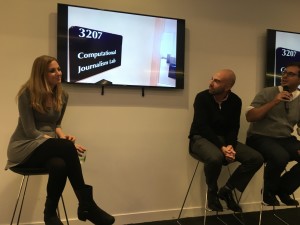Last night, I attended a panel discussion on “Algorithms and Automation in Journalism” hosted by my alma mater, the Merrill College of Journalism at the University of Maryland. My fellow alum Adam Ostrow, chief strategy officer at Mashable, moderated the discussion, which included Nick Diakopolous, UMD assistant professor, and Mashable’s Megan Specia, assistant real-time news editor.
Adam and Megan provided a lens into how they balance the power of algorithms against the need for human judgment when it comes to making news decisions at Mashable. Here are the take-aways:
- About four years ago, Mashable developed its own predictive analytics tool called Velocity to forecast which news stories will trend, but they also rely on third-party tools, like Dataminr (an “initial signal”) and Storyful (“for user-generated content and to verify stories”)
- Some advertisers and ad agencies are using Velocity for real-time branded content creation and distribution
- “Data frees us to do real journalism,” said Specia. “Making the phone calls, doing the research … access to data takes out the time-consuming act of filtering all the noise.”
- Mashable gets 55% of its traffic from social channels, but those who come directly to the site are offered top picks, which are selected by people (“prescriptive”) while algorithms drive the others
- Diakopolous suggested third-party services could do more to allow news organizations to plug in the characteristics they care about in order to yield richer data and ensure a “diverse media ecology”
- Perhaps the most intriguing part of the conversation, which Diakopolous called “the question of our time,” is whether news organizations should be more transparent about how/when/where they’re using algorithms for editorial judgment. Where did the data come from, was it clean, will you disclose errors in the data that are discovered later?
At a minimum, Diakopolous suggested news outlets should write a blog post explaining how they use data. Event guest Jay Kernis, of CBS Sunday Morning, wondered if the use of algorithms would lead to a new type of ombudsman to respond to audience questions about the data that led to a particular story.
What role do algorithms play in what appears in your news feeds every day? Would knowing which content is 100% automated change your media diet?


